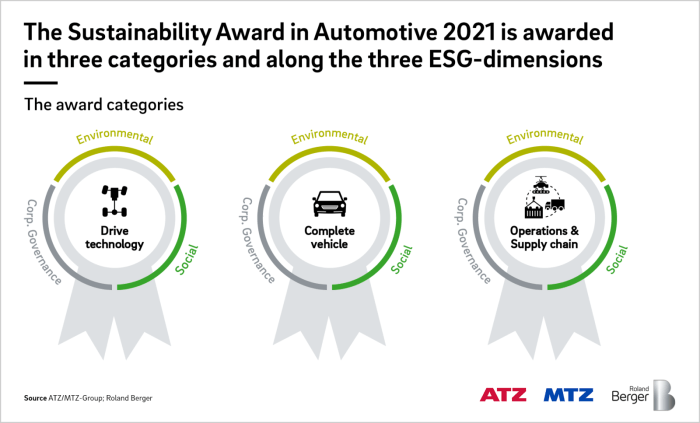Kicking off with Auto industry sustainability goals 2024, this opening paragraph is designed to captivate and engage the readers, setting the tone for what’s to come. The auto industry is at a critical juncture, with the need to prioritize sustainability becoming more pressing than ever. As we look towards 2024, the industry’s sustainability goals are poised to shape its future trajectory in significant ways. Let’s delve into the key aspects of these goals and explore the impact they can have on the environment, society, and the industry itself.
Importance of Sustainability Goals in the Auto Industry by 2024

Sustainability goals in the auto industry play a crucial role in shaping the future of transportation and manufacturing. These goals are essential for addressing environmental concerns, improving societal well-being, and ensuring the long-term viability of the industry.
Environmental Impact, Auto industry sustainability goals 2024
Setting sustainability goals helps reduce the carbon footprint of vehicles, leading to lower emissions and a healthier environment. By investing in eco-friendly technologies and practices, the auto industry can contribute to mitigating climate change and preserving natural resources.
Social Responsibility
By prioritizing sustainability, automakers can improve the quality of life for communities near manufacturing plants and reduce the impact of vehicle production on local ecosystems. Embracing sustainable practices also fosters transparency and accountability, enhancing trust among consumers and stakeholders.
Economic Benefits
Achieving sustainability goals can drive innovation and efficiency in the auto industry, leading to cost savings and increased competitiveness. By adopting renewable energy sources, optimizing supply chains, and promoting recycling initiatives, automakers can create a more resilient and profitable business model.
As we look towards the future of automotive innovation, the Ford Explorer 2025 stands out as a promising model. With cutting-edge technology and sleek design, this vehicle is set to revolutionize the driving experience. From advanced safety features to enhanced performance capabilities, the Ford Explorer 2025 is sure to impress even the most discerning drivers.
Stay tuned for updates on this exciting release!
Current Challenges in Achieving Sustainability Goals: Auto Industry Sustainability Goals 2024

As the auto industry strives to meet sustainability targets by 2024, several challenges stand in the way of achieving these goals. From supply chain issues to consumer demand, various obstacles must be overcome to make significant progress in sustainability.
Supply Chain Sustainability
One of the major challenges faced by the auto industry is ensuring sustainability throughout the entire supply chain. From raw material extraction to manufacturing processes, companies need to address environmental impacts at every stage. This requires close collaboration with suppliers to implement eco-friendly practices and reduce carbon footprint.
Transition to Electric Vehicles
Another obstacle is the transition to electric vehicles (EVs) to reduce greenhouse gas emissions. While EV technology has advanced significantly, there are still concerns about battery production, charging infrastructure, and the overall environmental impact of manufacturing electric cars. Companies need to invest in research and development to make EVs more sustainable and accessible.
Consumer Awareness and Behavior
Changing consumer behavior is also a challenge for the auto industry. While there is a growing demand for sustainable vehicles, many consumers still prioritize cost and performance over environmental considerations. Companies need to educate consumers about the benefits of sustainable transportation and offer incentives to encourage eco-friendly choices.
When it comes to the future of SUVs, the Ford Explorer 2025 is set to revolutionize the industry. With advanced technology, eco-friendly features, and sleek design, this model promises to be a game-changer. Stay ahead of the curve and discover what the Ford Explorer 2025 has in store for drivers looking for the ultimate driving experience.
Regulatory Compliance
Meeting stringent environmental regulations is another hurdle for automakers. As governments around the world implement stricter emissions standards and sustainability requirements, companies must invest in technology and innovation to ensure compliance. This includes developing cleaner fuel alternatives, improving fuel efficiency, and reducing overall environmental impact.
Technological Advancements
Despite these challenges, technological advancements offer solutions to overcome sustainability obstacles in the auto industry. From AI-driven manufacturing processes to renewable energy sources, companies can leverage technology to reduce waste, increase efficiency, and minimize environmental impact. By investing in innovation, automakers can accelerate progress towards achieving sustainability goals by 2024.
Strategies Implemented by Auto Companies for Sustainability
Auto companies are increasingly focusing on sustainability initiatives to reduce their environmental impact and meet sustainability goals. These initiatives involve a range of strategies aimed at improving efficiency, reducing emissions, and promoting responsible practices throughout the supply chain.
Specific Sustainability Initiatives Adopted by Leading Auto Manufacturers
Leading auto manufacturers have implemented various sustainability initiatives to reduce their carbon footprint and promote environmental stewardship. Some examples include:
- Investing in electric vehicle (EV) technology to reduce dependence on fossil fuels and lower emissions.
- Implementing recycling programs to reduce waste and promote the use of recycled materials in vehicle production.
- Adopting sustainable manufacturing practices, such as using renewable energy sources and reducing water consumption.
Examples of Innovative Practices Being Implemented to Achieve Sustainability Goals
Auto companies are embracing innovative practices to achieve their sustainability goals and drive positive change in the industry. Some innovative practices include:
- Implementing closed-loop recycling systems to reuse materials and reduce waste in production processes.
- Developing lightweight materials to improve fuel efficiency and reduce emissions in vehicles.
- Exploring alternative fuel sources, such as hydrogen fuel cells, to power vehicles in a more sustainable manner.
Role of Partnerships and Collaborations in Advancing Sustainability Efforts
Partnerships and collaborations play a crucial role in advancing sustainability efforts within the auto industry. By working together, companies can leverage their resources and expertise to drive innovation and create more sustainable solutions. Some key aspects of partnerships include:
- Collaborating with suppliers to ensure sustainable sourcing of materials and components for vehicles.
- Partnering with other industries and organizations to share best practices and promote sustainability across the value chain.
- Engaging with government agencies and NGOs to advocate for policies that support sustainable transportation and environmental protection.
Impact of Sustainable Practices on Consumer Behavior

Consumer behavior in the auto industry is significantly influenced by the sustainability efforts of companies. As more consumers become environmentally conscious, they are increasingly considering the sustainability practices of auto manufacturers when making purchasing decisions. This shift in consumer preferences has led companies to prioritize sustainability goals to attract and retain customers.
Changing Consumer Preferences
- Consumers are more likely to choose vehicles from companies that demonstrate a commitment to sustainability through eco-friendly manufacturing processes, use of renewable materials, and reduced carbon emissions.
- Younger generations, in particular, are driving the demand for sustainable vehicles, as they are more aware of environmental issues and seek to reduce their carbon footprint.
- Consumers are willing to pay a premium for vehicles that are produced sustainably and have lower environmental impact, indicating a growing market for eco-friendly options.
Influence on Purchasing Decisions
- Sustainability goals play a crucial role in consumers’ purchasing decisions, with many opting for brands that align with their values of environmental responsibility.
- Auto companies that prioritize sustainable practices are more likely to attract a loyal customer base that values sustainability, leading to increased brand loyalty and repeat purchases.
- Transparency in sustainability efforts, such as providing information on recyclability and energy efficiency, can positively impact consumers’ trust and confidence in a brand.
Benefits for Companies
- Companies that prioritize sustainable practices can differentiate themselves in the market, positioning themselves as leaders in environmental stewardship and gaining a competitive edge.
- By meeting sustainability goals, companies can enhance their reputation, attract socially conscious consumers, and build long-term relationships based on shared values.
- Investing in sustainability can result in cost savings through efficiency improvements, waste reduction, and lower energy consumption, contributing to long-term financial sustainability.
Final Review
In conclusion, Auto industry sustainability goals 2024 are not just aspirations but concrete steps towards a more sustainable future. By prioritizing sustainability, auto companies can not only reduce their environmental footprint but also attract a new wave of environmentally-conscious consumers. As we move towards 2024, these goals will continue to drive innovation and shape the industry’s landscape in profound ways.
- Top automotive trends in 2024: A Glimpse into the Future of Driving - January 7, 2025
- Automotive news for car enthusiasts: Stay updated with the latest trends, iconic cars, performance insights, and more! - January 6, 2025
- Latest electric car launches 2024: Anticipated Models, Key Players, and Technology Trends - January 5, 2025









